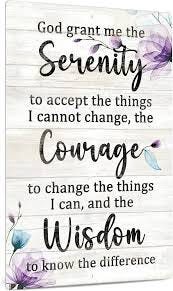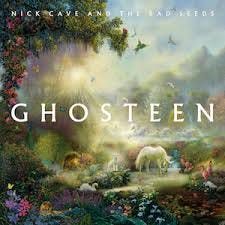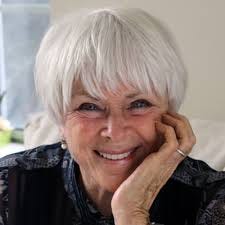Acceptance: learning to deal with the world as it is.
Accepting we can't change the past, other people, and that we live in a world of risk - no matter how much we may want to - is perhaps the biggest lesson of all...
There is one piece of wisdom I have struggled with more than any other – embracing the concept of acceptance.
And yet, the people who have consistently offered me wisdom that works believe it is the key to living a balanced and fulfilled life. Despite that, on hearing it many – including me at first – push back, interpreting it as meaning we should take any amount of crap and not try to do anything about it. “Acceptance” can sound like a code word for giving up - prompting the question: What if Gandhi, Martin Luther-King and Nelson Mandela had just accepted their lot?
This misses the point of what is meant by acceptance – and the Serenity Prayer prayer is good start at understanding why:
Half of the prayer is about is about learning to deal with things that just are and can’t be changed - urging us to accept the world as it is, not how we want it to be.
So, what are the things that cannot be changed? For me, there are four big areas that are set in stone:
1) We live in a world of risk – and that will inevitably result in everyone experiencing things that feel arbitrary, cruel or desperately unfair.
2) You cannot change what has happened to you.
3) You cannot change other people – they must want to change first.
4) Everything ends. Everything.
All of these things are irrefutable – and at times I have experienced suffering, embarking on the fool’s errand of resisting that fact. If we insist on challenging one or all of them, we will struggle, and in some cases, that can derail an entire life.
Let me take each one of them in turn.
1) We live in a world of risk:
Bad things happen all the time. Like it or not, that is a by-product of living in a system where risk is prevalent. Of course, within reason, we can and should do what we can to limit that risk and protect people – but we will never change the fact that any one of us can get seriously ill at any moment, have an accident, or have loved ones taken from us when we believe it is long before their time.
Just watch or read the news - it can seem like one long list of suffering all over the world. And yet when something awful happens to us or those we love, we can spend years railing against a system – which we never asked to be part of – angry at its random, apparently amoral nature.
Nick Cave’s album Ghosteen is instructive here. It has been described as “a holistic portrait of a father grieving,” and ends with a fourteen-minute song called “Hollywood”. It begins with a description of Cave having left the mother of his dead son sleeping, ostensibly on a journey towards Malibu, but really searching for some sense in the world.
The second half of the song tells the story of Kisa, who is devastated that her baby is dying. She goes to the Buddha, who urges her not to cry before telling her:
“Go to each house and collect a mustard seed,
But only from a house where no one has died.
Kisa went to each house in the village,
My baby is getting sicker, poor Kisa cried,
But Kisa never collected one mustard seed.”
The point is, there is no house that has not been touched by death - all of the inhabitants have experienced loss, pain and suffering:
“She hugged her baby and cried and cried,
She said everybody is always losing somebody,
Then walked into the forest and buried her child,
Everybody’s losing someone,
Everybody’s losing someone.”
There’s no hiding it. There is a brutal truth in this. But it is also the way things are. If we can’t find an accommodation with that, we will intensify our pain. Cave acknowledges this - and the journey we must all go on to process it:
“It’s a long way to find peace of mind, peace of mind,
And now I’m just waiting for mine to come,
And I’m just waiting for peace to come.
For peace to come.”
Many struggle with Kisa’s lesson. They believe that they are betraying others and themselves if they accept that we live in a world where trauma, risk, death and supposed unfairness are par for the course. Many come to feel defined by their pain and grief. The are lost in bitterness. They worry away at it. This is not about denying emotions like anger and despair. It is about allowing ourselves to fully process them and, when we have, to let them go.
This is what Nick Cave is doing at the end of the song and the album - acknowledging the pain, sitting with it, letting it run its course. He knows he is on the cusp of peace and that if he accepts, it will ultimately come.
So many of the people I have talked to have gone through extraordinary trauma. It devastated them - and while they would never wish what happened to them on their own worst enemy - they have found a place of acceptance where they have learned and grown.
I will go into this in much more detail in a later piece.
2) You cannot change what has happened to you:
I am often struck by how many people I talk to are defined by their past – allowing it to poison their present and their future. They rail against the sheer shrieking unfairness of it all - asking why they have been dealt such a terrible hand.
Someone who is close to me is unable to accept that they have an abusive mother, who has never been able to show love.
Talking to them, it is as if the magnitude of those facts are so great it has sucked them into an orbit of pain and they are incapable of finding escape velocity. If only they could accept it, they could stop being defined by their past and set free. I sometimes wonder if the thought of accepting it is frightening because it would mean giving up a core part of who they are. Coming to terms with it might change them - and that is scary.
Byron Katie (seen below) is an expert in talking to people stuck in the pattern of their past. In her classic book, “Loving What is” she listens to people stuck with a sense of injustice. As they recount their pain, one word comes up repeatedly – and the reader comes to realise that it is perhaps the most toxic in the English language. That word is: Should.
Time and again people lament what should and should not have happened, how people should and should not have behaved. Katie (she refers to herself by her surname) points out the futility of those thoughts. There is no point trying to re-write the past. The fact is something did happen and focusing on should and should not will change nothing.
In one heart-breaking case study we hear from a woman unable to get over the fact that her husband died and left his money to someone else. Katie tells her:
“The world is what it is. Where the world is concerned, there is no should be. The world is as it should be - and when I oppose it, I feel hurt.”
Katie tries to shake her out of the cycle of pain by challenging each of the statements she makes by asking a series of questions:
- Is it true?
- Can you absolutely know that it is true?
- How do you react when you believe that thought?
- Who would you be without that thought?
In short, she is asking people to come to terms with the world as it is – not as they want it to be. This takes a moment. It’s tempting to think you are being asked to accept injustice. In fact, it is about not being in conflict with reality. That does not mean that we should allow people to continue to abuse us, or try to change or remove ourselves from a situation. But the past is done.
Katie suggests that to become truly whole, we must learn to love what is, hence the title of her book.
Michael Singer came at it from a different angle when we talked:
MICHAEL: Acceptance is a word a lot of people have trouble with. So I get it down to this: a moment unfolding in front of you. It already happened. You can't stop it from having happened. So, accept reality to start with, because you can't change reality. You can't change the past, and you can't change the exact moment that just unfolded. Somebody actually said what they said, somebody actually walked away from you. Somebody actually told you they love you more than anything in the whole world. Events happen. You now choose: resist or accept.
CRAIG: I just want to be clear, you're not saying that they should accept that's okay. You're basically saying those things have happened to you, now how do I deal with it, to make sure that I'm okay going forward?
MICHAEL: It means you deal with it from a real place of clarity. The event happened, okay? It disturbed me, well, that happened too, that's reality also. Understand that. Can you handle that it happened and can you handle that it disturbs you?
3) You cannot change other people (unless they are willing to change)
There is perhaps nothing more frustrating than having someone in your life that you believe is damaging themselves, you, or others and refuses see it.
As a child, I spent too long thinking I could change others.
As an adult, I have tried to get someone to see that their behaviours are sabotaging themselves and our relationship.
I am sure that others have tried to change me and I have been blind to my faults and flaws.
The phrase that comes to mind is: There are none so blind as those who cannot see. Again, I return to Michael Singer who wrote in, “Living Untethered” that once you have realised that you need to change:
“You will wish you could go back and say, ‘I’m sorry, I was so lost.
I find that quote profoundly moving because it is something I experienced – a realisation that I had not always gone about things the right way and that my actions had caused myself and others pain. It took repeated shocks to get me to realise I needed to approach life differently. I had reached a point where I was ready and could see no alternative. Until I got there, I had a massive blindspot and advice and wisdom were like pebbles bouncing off a tank.
I now take the view that I can let people know what I think – but if they reject it - or want to push back - I will let it be. I have said my piece and raising the stakes and escalating the situation helps no one. In fact, when I am calm, measured and prepared to step back, that person will either seek me out and want to talk, or spin away from me. Both are preferable to endless attrition.
The journalist, Tom Bradby (seen below), summed all of this up by saying:
“It really helps to develop a meaningful sense of fatalism in life.”
We talked around this for some time:
TOM: Now, [fatalism] is not the same as saying you give up on trying to do the things you want in life, or doing your reasonable best to create the life for yourself that you want. But we have a deluded sense about how much of our destinies we control, and how much of our fates we can actually affect. There are lots of things we can affect, and there are lots of things we can't affect.
And it’s important just to be realistic, and fatalistic, about all the things we can't. You know, you can't control what people think of you. You can't control threats that are gonna come from nowhere. You can't keep everyone you love alive indefinitely. You can't keep yourself alive indefinitely.
ME: I think that's so true. The penny dropped when I was listening to somebody saying, ‘Look, you're one of eight billion people on a planet. You've got a very small perspective. There's all this stuff going on out there that you've never touched or even thought of, and so what makes you think you can control it, or that the act of trying to control everything is going to actually work in any way, and cause you anything other but stress and unhappiness?
TOM: Do you know, we had to put our poor dog down the other day. She had cancer and she was in horrible pain; it was the right thing to do. And I kind of got a bit of PTSD after it. Not from that specifically, but from my parents getting ill and dying, everything else. And I think part of it is that crystallisation, that every creature on this planet has their time to die, and you're gonna have your time to die, and I'm gonna have my time to die.
And I found myself thinking, ‘Am I gonna be ready?’ I definitely don't wanna die, I'd like to live to a hundred If I possibly can. But we're going to, and you don't know when, and you don't know why, and that’s just in the bracket of things that you don't control.
And I remember, you know, my psychiatrist was quite big early on in talking about the Serenity Prayer, which I'm sure everyone listening to this will know: ‘God, give me the serenity to accept what I can't change, the courage to change what I can, and the wisdom to know the difference’. And I've been over that so many times in my head, partly because the things you can't change is, as we've discussed, a much bigger bracket then you think.
4) Everything ends:
In my introductory piece I wrote about how one day I saw the fundamental pattern of things:
- Something does not exist, then comes into being;
- It gains momentum;
- It peaks;
- Then it starts to fade;
- And it ends.
I realised there is nothing this doesn’t apply to – relationships, objects, your life, the planet we live on…even the universe will one day end. We can resist it, lament it, try to cling on. But we will not be able to change the fundamental reality.
As I write this, I am looking out of the window at a large tree. It looks the same today as it did yesterday. And if I look tomorrow, it won’t have changed. But in a few months, it will have changed utterly. The branches that are now bare will be thick with green leaves. A few months later, those leaves will turn red, russet and golden-brown. Eventually they will drop off and the branches will be naked again. I could try to create a scheme which attempts to freeze this process, and it might even have limited success, but ultimately it would be a fool’s errand, frustrating me and possibly destroying the tree.
An alternative approach is to accept this and to try to tune into the frequency of things, working with things as they are, not as we want them to be. This is the wisdom behind the famous passage in Ecclesiastes, that begins:
“There is a time for everything,
and a season for every activity under the heavens:
a time to be born and a time to die,
a time to plant and a time to uproot,
a time to kill and a time to heal,
a time to tear down and a time to build…”
This is the system – I can curse it, say it is stupid, say it would be better if it were another way, and it will get me nowhere.
When I accept this and try not to force things, I feel that I am more synchronous with my environment, working with rather than against the system.
There are two classic ways of attempting to beat this system – trying to cling on to things we love and pushing away things we do not like. How many relationships curdle because one person is clingy, needy, controlling or fails to see things have run their course? How many people don’t want the party to end? How many parents want to stop their children moving on because they can’t stand the thought of an empty nest?
Alternatively, how often do we suppress or avoid the unpleasant? Nowhere is this clearer than in our approach to the fact that one day – perhaps sooner than we think – we will die. Many of us spend our entire lives in denial of this basic fact. The result is an inordinate amount of pain and suffering – so much so that I will dedicate two pieces to this later in the series.
So, we must accept the things we cannot control. We must deal with things as they are - and not as we want them to be.
This is easy to say and hard to do. But the wisdom here is clear:
By identifying acceptance as something to be aimed for - we put ourselves on the right track. Slowly, over time, we waste less energy fighting an unwinnable battle. And that energy can be poured into healing ourselves and living better.
In the next couple of pieces I will look at the damage trauma can cause – and how we can deal with it through the process of letting go.
Notes:
“Hollywood” - Nick Cave and The Bad Seeds;
“Loving what is”, Byron Katie - https://thework.com/loving-what-is-revised-edition/
“Desperartely Seeking Wisdom” podcast - Michael Singer talking to me:
https://www.desperatelyseekingwisdom.com/episodes-series-2/desperately-seeking-wisdom-michael-singer
“Living Untethered” - Michael A. Singer:
https://untetheredsoul.com/living-untethered
“Desperately Seeking Wisdom” podcaast - Tom Bradby talking to me:
https://www.desperatelyseekingwisdom.com/episodesseries1/desperately-seeking-wisdom-with-tom-bradby
“Ecclesiastes” - https://ebible.org/pdf/eng-web/eng-web_ECC.pdf










That’s great to hear, Veronica.
I think there’s a lot of people feeling the same way, who find a lot of the “help” a little simplistic or over the top.
I’m feeling my way - so it’s good to get constructive, helpful feedback.
That’s great to hear, Paola.